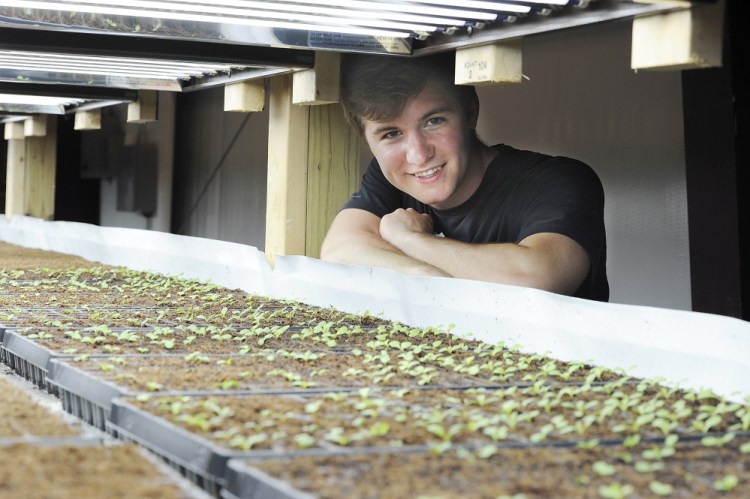Trevor Kenkel was a promising student athlete from Montana when he first came to look at Bowdoin College. Then in his senior year in high school he suffered a concussion during a football game that changed his life radically.
Part of his long recovery was revisiting a hobby he’d started as a young teenager, growing greens for his family in an aquaponics system he’d engineered himself. Today he’s half-Bowdoin student, half-farmer, running an aquaponics business on a farm in Lisbon. We called him up to learn how a fateful football injury helped turn him into an advocate for sustainable agriculture.
FOR THE LOVE OF THE GAME: Kenkel started playing football as “a little guy” in Montana. He was recruited by East Coast schools and fell in love with Bowdoin, and Maine, on a recruiting trip. He was planning to come to Bowdoin when he got hit in a game in 2012. On the sidelines, he said he was asked a few questions – the basis of concussion diagnosis – answered them correctly and was sent back on the field, only to get hit again.
“And I got a second concussion,” he said. “Which made the effects of what would have been a run-of-the-mill concussion even worse.” He took a gap year to recover. “During that first year I wasn’t able to do anything,” he said. “There was a lot of laying around in a dark room.” He had headaches, sensitivity to light, sound and smell, as well as trouble sleeping.
GARDEN THERAPY: One of the few activities he still enjoyed was spending time in his garden. “To watch everything grow and thrive in an environment you have created is a very special feeling,” Kenkel said. But his wasn’t a traditional garden.
At 14, he’d had a summer job building fences in Montana, and with the proceeds of that job had started his own little aquaponics operation, using fish and the nutrients they produce to help power the growth of produce. Eventually, the family built a greenhouse in Montana and Kenkel “made my family self- sufficient with our greens.”
Eventually his parents brought him to MassGeneral Hospital for Children in Boston for treatment and relocated the whole family to make trips to the hospital easier.
PORTLAND EATS: He still wanted to go to Bowdoin, and the family had become entranced by Maine’s interest in local foods and particularly, the Portland food scene. “Maine cares a lot about its food,” Kenkel said. On of his first meals was at “an Italian restaurant that was absolutely wonderful, I think Piccolo is what it is,” he said. “And Duckfat – they have got amazing food. I haven’t eaten in Portland yet and been unsatisfied with a meal.” He worked away on a business plan in between physical therapy sessions. In August 2014, he entered Bowdoin, with plans to major in biology. And a plan to be a farmer simultaneously.
LISBON CALLING: The family’s interest in aquaponics shifted easily from Montana to Maine. With the help of a Massachusetts firm, Kenkel developed an engineering system that would take his system to a much bigger level. The family acquired a 160-acre farm in Lisbon and dubbed it Springworks. It had the advantage of being close to Bowdoin, although throughout his freshman year, Kenkel had to catch rides out to the farm to work on the project (Bowdoin doesn’t let freshmen keep cars on campus).
FARM FACTS: Primarily Springworks is growing lettuces, but Kenkel plans to add basil and mizuna to the mix in the 6,000-square-foot greenhouse. The fish aren’t likely to be on anyone’s menu soon (they take 9 to 12 months to grow to maturity) but Kenkel has visions of hosting a fish fry for the community, or possibly for his Bowdoin classmates with some of his chief fertilizers down the road. “We’ll be using tilapia,” Kenkel said. “We also have some goldfish in the system because they are hearty and great for starting. Eventually, we want to try to use Maine’s native fish, like white perch.”
The local eagles might be interested in any cast-offs from those “crops.” “The eagles have been going crazy around here because of the herring run,” he said. “We have a stream right near here.” Springworks is also planting orchards, berries and vegetables in the soil outdoors.
GOODBYE TO ALL THAT: His recovery has gone well, but one thing Kenkel won’t be doing is wearing the black and white Bowdoin jersey on the football field. “I don’t think I am allowed to play anymore,” he said. “With my head it is just too much of a risk at this point.”
POST-GRAD: Kenkel is looking for customers, particularly chefs looking for sustainably grown produce in the off-season. Springworks has a farm stand. When he graduates from Bowdoin, he plans to work full time at Springworks. “That’s the hope,” Kenkel said. “I’ve always been passionate about sustainable agriculture. That is really where I want to go and what I want to do. I’m trying to get this technology out to as many people as I can.”
Send questions/comments to the editors.



